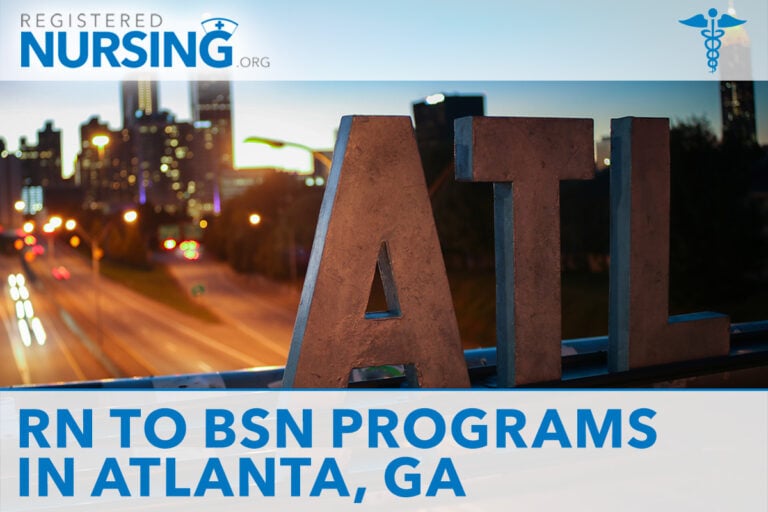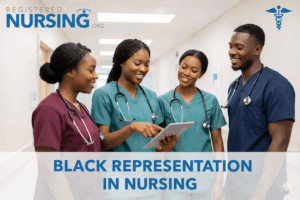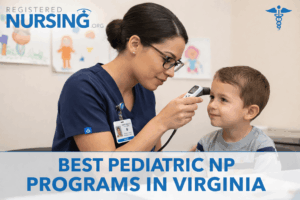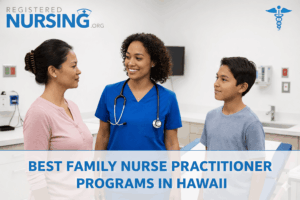RN to BSN Programs Near Atlanta, GA: A Guide for Working Nurses
- 2026 Best RN to BSN Programs in the Atlanta Metro Area
- Why Atlanta RNs Are Pursuing BSN Degrees
- Understanding RN to BSN Programs: What’s Different from Your ADN
- Program Formats for Working Atlanta Nurses
- Top Considerations When Choosing an Atlanta-Area Program
- Tuition Costs and Employer Support in Atlanta
- Admission Requirements and Application Process
- Career Advancement After BSN in Atlanta
- Frequently Asked Questions
- Latest Articles & Guides

As Atlanta continues its growth as the Southeast’s premier healthcare hub, the landscape for registered nurses is evolving rapidly. You’ve already earned your RN license through your ADN or diploma program, gaining valuable clinical experience in one of the nation’s most dynamic healthcare markets. Now, you’re considering the next step: completing your Bachelor of Science in Nursing (BSN) degree while maintaining your career, income, and life in metro Atlanta.
Major Atlanta healthcare systems, including Emory Healthcare, Grady Health System, Northside Hospital, and Children’s Healthcare of Atlanta, increasingly prefer or require BSN-prepared nurses for specialty positions, leadership tracks, and career advancement opportunities. The shift isn’t about diminishing the value of your ADN education; it’s about positioning yourself for the evolving demands of complex healthcare delivery and leadership roles that shape patient outcomes across our region. RN to BSN programs are designed to help you reach this goal.
In this article, you’ll learn:
- How Atlanta’s major healthcare systems support RN to BSN education through tuition assistance
- Which program formats work best for 12-hour shift schedules
- What salary increases and career advancement opportunities await BSN-prepared nurses in metro Atlanta
- How to evaluate programs based on accreditation, cost, and flexibility
Atlanta RN to BSN Quick Facts:
- Average completion time: 12-24 months while working full-time
- Typical tuition costs: $15,000-$30,000 total program
- RN salary in Atlanta averages $77,700 (2024 data)
- Most major Atlanta health systems offer tuition assistance
- BSN opens doors to specialty units, leadership roles, and Magnet hospitals
2026 Best RN to BSN Programs in the Atlanta Metro Area
Clayton State University
Morrow, GA - Public 4-Year - clayton.edu
RN to BSN - Bachelor of Science in Nursing – RN Completion Track
Campus Based - Visit Website
Clayton State University's RN to BSN program offers a practical pathway for registered nurses to earn their Bachelor of Science in Nursing through its campus-based RN Completion Track. Tailored for working professionals, this program builds on existing clinical experience and allows transfer of prior college credits. The curriculum enhances nursing knowledge, critical thinking, and professional skills, with flexibility to support career advancement. As a bachelor's level program, no ACT or SAT entrance exam is required. Key highlights include its location in Morrow, GA, and its focus on undergraduate nursing education for working nurses.
- RN Completion Track available
- Part of School of Nursing
- Located in Morrow, GA
- Undergraduate nursing program
- Pathway for working nurses
Georgia State University
Atlanta, GA - Public 4-Year - gsu.edu
RN to BSN - Nursing, R.N. to B.S.N.
Online Learning - Visit Website
Georgia State University's online RN to BSN program enables registered nurses to earn their bachelor's degree in just three semesters through a flexible 30-credit-hour curriculum. This program emphasizes advanced clinical reasoning and analytical skills development while requiring minimal clinical rotations, with only two courses needing in-person components. Designed for working professionals, it maintains a 2.5 GPA requirement and requires current RN licensure but does not mandate ACT or SAT exams for admission. Graduates are prepared for leadership positions and further graduate studies in nursing, with the program holding proper nursing accreditation for quality assurance.
- Online 3-semester program
- 30 credit hours total
- Minimal clinical rotations
- Prepares for advanced nursing roles
- Supports graduate study pathways
- Flexible course scheduling
- Strengthens clinical reasoning
- Accredited nursing program
- GPA requirement: 2.5
- RN licensure required
Kennesaw State University
Kennesaw, GA - Public 4-Year - kennesaw.edu
RN to BSN - RN-BSN Program
Online & Campus Based - Visit Website
Kennesaw State University's RN-BSN program provides registered nurses with a flexible hybrid pathway to earn their bachelor's degree, combining online coursework with on-ground components to accommodate working professionals. The program offers advanced placement, allowing RNs to bypass sophomore and junior clinical courses and earn up to 27 semester hours through a bridge course. Emphasizing community and family nursing, it includes clinical experience opportunities and an accelerated four-semester option. As a CCNE-accredited program with multiple admission paths, it focuses on professional development without requiring ACT or SAT entrance exams, leveraging a strong liberal arts foundation and comprehensive prerequisites.
- Fully CCNE accredited nursing program
- Flexible online and on-ground formats
- Advanced placement for RNs
- 27 semester hours credit potential
- Community and family nursing focus
- Accelerated four-semester option
- Multiple admission paths
- Clinical experience opportunities
- Comprehensive prerequisite requirements
- Strong liberal arts foundation
South Georgia State College
Douglas, GA - Public 4-Year - sgsc.edu
RN to BSN - Bachelor of Science in Nursing (RN-BSN)
Online Learning - Visit Website
South Georgia State College offers an online RN-BSN program that allows registered nurses to earn their Bachelor of Science in Nursing while maintaining work commitments. This 24-month program requires 30 additional credits, bringing the total to 122 credits for degree completion. Admission prerequisites include an active RN license, a minimum 2.5 cumulative GPA, and successful background and drug screenings. Notably, no HESI A2 entrance exam is required. The curriculum supports clinical experiences at students' workplaces and mandates a minimum grade of 'C' in all courses, providing a practical pathway for career advancement without interrupting professional duties.
- Online RN-BSN completion program
- Requires existing RN license
- 2.5 minimum cumulative GPA
- 24-month program completion
- No HESI A2 Exam required
- Clinical experiences possible at workplace
- Minimum 'C' grade requirement
- Background check mandatory
Why Atlanta RNs Are Pursuing BSN Degrees
The healthcare landscape in metro Atlanta has shifted decisively toward bachelor’s-prepared nursing workforces. Emory Healthcare, Atlanta’s largest healthcare system and a Magnet-designated organization, strongly prefers bachelor’s-prepared candidates for specialty areas and offers robust educational support. Grady Health System, the region’s safety-net hospital and Level I trauma center, increasingly seeks BSN-prepared nurses, particularly for critical care specialties. Northside Hospital, another Magnet-designated system, has made significant commitments to BSN-prepared nursing workforces across service lines.
Learn more about nursing programs in Atlanta.
The BSN Advantage in Atlanta’s Job Market
Specialty unit access represents one of the most immediate benefits. Intensive care units, emergency departments, operating rooms, and specialized services increasingly list BSN degrees as preferred or required for new hires. Leadership and management opportunities almost universally require bachelor’s degrees at minimum. Magnet hospital requirements drive significant preferences for BSNs; Emory Healthcare and Northside Hospital’s Magnet status means these prestigious employers actively recruit and retain BSN-prepared staff.
| Factor | ADN-Prepared RN | BSN-Prepared RN |
| Starting Salary (Atlanta) | $65,000-$72,000 | $70,000-$78,000 |
| Specialty Unit Access | Limited, primarily med-surg | Preferred for ICU, ER, OR, specialty services |
| Leadership Opportunities | Rarely eligible without additional education | Management track accessible |
| Magnet Hospital Hiring | Competitive disadvantage | Preferred or required candidate |
| Graduate Education | Requires BSN completion first | Direct entry to MSN programs |
Understanding RN to BSN Programs: What’s Different from Your ADN
Your ADN or diploma education provided exceptional clinical preparation. RN to BSN programs don’t repeat this foundation; instead, they build upon your experience with content that prepares you for leadership, population health, research utilization, and systems-level thinking.
What You Won’t Repeat: Clinical skills, medication administration, basic nursing fundamentals. Your RN license validates these competencies.
Typical RN to BSN Curriculum Focus:
- Evidence-based practice and nursing research
- Community and population health
- Leadership and healthcare policy
- Professional nursing role development
- Advanced health assessment concepts
Credit Requirements: BSN degrees require approximately 120 total credits. Your ADN likely provided 60-72 credits. Most RN to BSN bridge programs require 30-45 additional credits (10-15 courses).
Clinical Hours: Unlike your initial nursing education, RN to BSN programs emphasize community health practicums, leadership observation, and capstone projects. Many programs allow your work hours to fulfill certain requirements, particularly for leadership observation and capstone projects coordinated with your employer.
Program Formats for Working Atlanta Nurses
Online RN to BSN Programs:
- 100% online coursework through learning management systems
- Asynchronous content allowing study during off-hours
- No commuting (significant in Atlanta traffic)
- Clinical hours often at your current workplace
- Best for: Night shift nurses, unpredictable schedules, long commutes
Hybrid Programs:
- Mostly online with occasional on-campus sessions
- Weekend intensives for labs or collaborative work
- Some networking opportunities
- Best for: Nurses wanting face-to-face interaction
Discover other nursing schools in Georgia.
Can I Work Full-Time While Completing RN to BSN?
Yes, most Atlanta nurses do. Programs are designed for working RNs. Expect 10-20 hours of coursework per week. Peak intensity during midterms, finals, and capstone projects requires extra time and schedule considerations. Success requires family understanding and sometimes saying “no” to extra shifts. The trade-off: 12-24 months of intense focus opens up years of enhanced opportunities.
Top Considerations When Choosing an Atlanta-Area Program
Accreditation (Non-Negotiable): CCNE or ACEN accreditation is essential. Non-accredited programs create serious problems; Atlanta employers may not recognize the degree, and future MSN programs will likely reject applications.
Cost Comparison:
- Georgia public universities: $15,000-$22,000 for in-state residents
- Private universities: $20,000-$35,000
- Out-of-state online programs: $18,000-$40,000
Schedule Flexibility: Investigate start dates (rolling vs. annual), course load options, and clinical scheduling flexibility. Programs recognizing students are working professionals provide evening/weekend support and flexible clinical arrangements.
Transfer Credit Policies: Request transfer credit evaluations early, specifying exactly which credits will transfer. This significantly affects program length and total cost.
Tuition Costs and Employer Support in Atlanta
Major Atlanta Employer Tuition Assistance
| Healthcare System | Annual Assistance | Key Requirements |
| Emory Healthcare | Varies by position | Maintain employment, performance standards, service commitment |
| Grady Health System | Program varies by role | Full/part-time status, grade requirements |
| Northside Hospital | Up to $5,000 annually | Minimum employment period, good standing |
| Wellstar Health System | Tuition reimbursement available | Employment requirements, approval process |
| Children’s Healthcare of Atlanta | Educational assistance program | Performance standards, service agreement |
| Piedmont Healthcare | Varies by facility | Employment tenure, manager approval |
Important Considerations for Employer Tuition Assistance:
- Service Commitments: Most require 1-2 years of employment after receiving assistance
- Reimbursement vs. Prepayment: Most reimburse after course completion; plan cash flow accordingly
- Grade Requirements: Usually B or higher for reimbursement
Admission Requirements and Application Process
Standard Requirements:
- Active Georgia RN license (unencumbered)
- Associate degree or diploma in nursing
- Minimum GPA (typically 2.5-3.0)
- Official transcripts
- Current CPR certification
- Professional references (1-2)
Application Timeline: Most programs offer rolling admissions with multiple start dates annually.
- 6-8 weeks before: Submit application, request transcripts
- 4-6 weeks before: Complete supplemental materials
- 2-4 weeks before: Receive admission decision
Application Checklist: ✓ Active Georgia RN license ✓ Official transcripts from all institutions ✓ Personal statement (if required) ✓ Professional references ✓ Resume documenting nursing experience ✓ Current CPR certification ✓ Immunization records ✓ Background check authorization ✓ FAFSA completion
Career Advancement After BSN in Atlanta
Immediate Opportunities:
- Specialty Unit Transfers: ICU, ER, OR positions become accessible
- Charge Nurse Positions: Shift leadership with $3-8/hour premiums
- Quality Improvement: Evidence-based practice and outcomes analysis
Leadership Pathways:
- Nurse Manager: Unit-based management, $85,000-$105,000
- Clinical Coordinator: Specialty service line coordination, $75,000-$95,000
- Case Management Leadership: Complex care coordination
Learn more about nursing careers and specialties.
Salary Progression for RNs in Atlanta
| Role | ADN-Prepared | BSN-Prepared | Difference |
| Staff Nurse (0-2 years) | $65,000-$72,000 | $70,000-$78,000 | +$5,000-$6,000 |
| Experienced RN (5+ years) | $75,000-$82,000 | $80,000-$88,000 | +$5,000-$6,000 |
| Charge Nurse | $78,000-$85,000 | $85,000-$95,000 | +$7,000-$10,000 |
| Nurse Manager | Rarely eligible | $90,000-$110,000 | Career access |
Completing your RN to BSN program represents an investment in your professional identity and career trajectory in Atlanta’s dynamic healthcare environment. The 12-24 months you invest, while challenging alongside full-time work, open decades of enhanced opportunities. Metro Atlanta’s major healthcare systems increasingly emphasize bachelor’s-prepared workforces because complex healthcare delivery requires the expanded competencies that BSN education provides.
Start by exploring programs, requesting transfer credit evaluations, and investigating your employer’s tuition assistance. Talk with your manager about your educational goals. Connect with colleagues who’ve completed their BSN while working. Their experiences provide invaluable perspective on what to expect and how to succeed.
Frequently Asked Questions
Q: Will my employer pay for my RN to BSN degree? A: Most major Atlanta healthcare systems offer tuition assistance ($3,000-$5,250 annually, typically). Requirements include maintaining employment, meeting GPA standards (typically a B or higher), and fulfilling service commitments (1-2 years). Contact your HR department for specific details about your organization’s program.
Q: Can I use my current job hours for clinical requirements? A: Many programs allow leadership observation, capstone practicum, and some community health hours at your current workplace. However, community health requirements often mandate experiences outside acute care to ensure population health exposure. Confirm specific policies with programs before enrolling.
Q: Do Atlanta hospitals really care if I have a BSN? A: Yes, increasingly so. You won’t lose your current job, but specialty units (ICU, ER, OR) prefer or require a BSN for new hires. Leadership positions almost always require a minimum of a BSN. Magnet hospitals (Emory, Northside) show a strong preference for BSN-prepared nurses. The trend continues strengthening across Atlanta healthcare.
Q: What’s the difference between Georgia and out-of-state online programs? A: Both can be excellent if they are CCNE or ACEN-accredited. Georgia programs often have established clinical partnerships in Atlanta and immediate employer recognition. Out-of-state programs may offer different pricing or scheduling options, but may also require you to arrange your own clinical sites. Verify accreditation, confirm Atlanta employers recognize the program, and compare total costs.
Latest Articles & Guides
One of the keys to success as a registered nurse is embracing lifelong learning. Our articles and guides address hot topics and current events in nursing, from education to career mobility and beyond. No matter where you are on your nursing journey, there’s an article to help you build your knowledge base.
Browse our latest articles, curated specifically for modern nurses.



